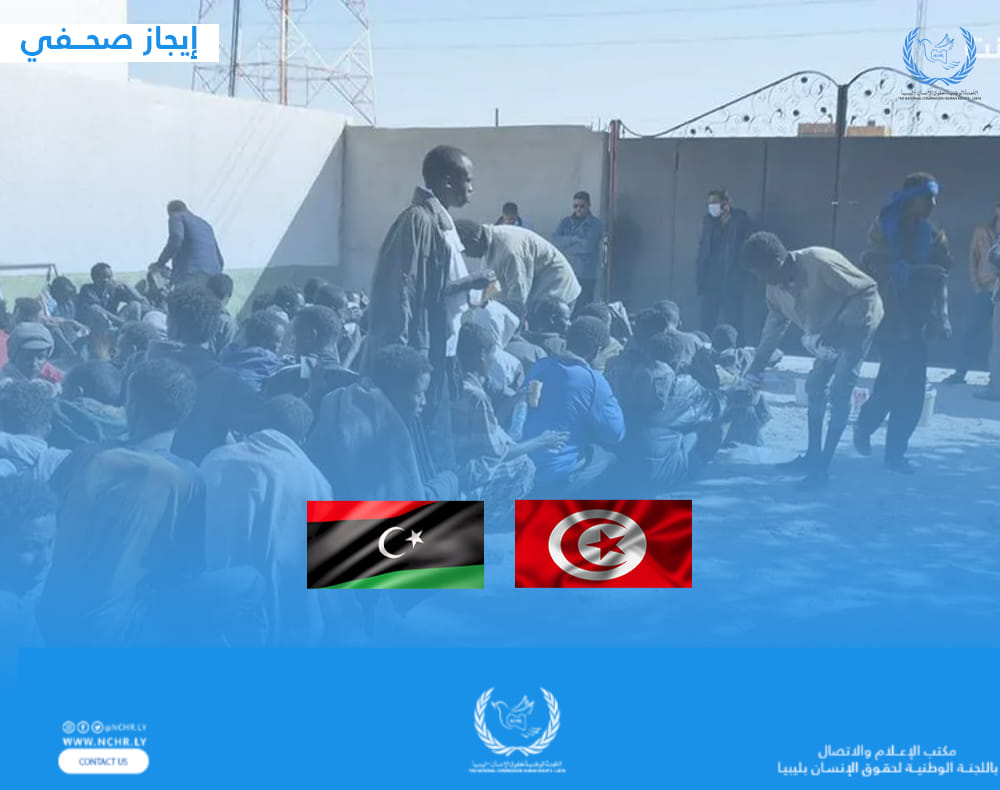The National Committee for Human Rights blames the Tunisian authorities for the fate of the migrants on the Libyan-Tunisian border.
Pulbished on:
Tripoli, July 20, 2023 (LANA) - The National Human Rights Committee expressed its concern about what it described as preliminary information regarding deaths of irregular migrants and asylum seekers on the Libyan-Tunisian border.
The committee said in a press statement that ((preliminary information indicates the death of three immigrants, including a "woman") as a result of their stay without food and water, in the open, bad weather and high temperatures in remote desert areas where all the necessities of life are lacking).
The committee added, "These victims, who died as a result of the inhuman suffering they went through, were among the migrants who were transferred by the Tunisian authorities from several Tunisian states, where they were present, to the Libyan-Tunisian border."
In this regard, the Committee expressed its condemnation and denunciation of these inhumane practices against these immigrants and asylum seekers who are on Tunisian territory by the Tunisian authorities, who imposed on them this human suffering as a result of their transfer to the Tunisian-Libyan border, and forced them to remain in the open in remote desert areas that lack all the necessities of life with high temperatures and the lack of water, food and medicine.
In its statement, the committee held the Tunisian authorities fully responsible, legal and humanitarian, for this humanitarian crisis, which they fabricated on its borders with the Libyan side, and used it for political ends, in order to achieve political gains with the European side at the expense of its legal and humanitarian obligations under international human rights law, international humanitarian law, and the 1951 Refugee Protection Convention, which was ratified and acceded to by the Republic of Tunisia.
The committee said ((In front of the exacerbation of this unprecedented human suffering experienced by irregular immigrants and asylum seekers who are present in the Tunisian-Libyan border areas, we call on the Libyan authorities represented by the Presidential Council, the Government of National Unity and the Agency for Combating Illegal Immigration, to quickly move urgently to save these immigrants and asylum seekers who are vulnerable and in a very serious condition as a result of the human suffering they are going through, and work to transfer them to shelter centers affiliated with the Agency to Combat Illegal Immigration and provide them with emergency humanitarian and medical assistance, and to enable international organizations working in the fields of migration to reach them to provide them with humanitarian and medical assistance, and to arrange for their deportation, voluntary return, and humanitarian evacuation to their countries through coordination with the embassies of their countries, the International Organization for Migration, and the United Nations High Commissioner for Refugees.
In this context, the Committee called on the Tunisian and Libyan authorities to work to find a solution to this issue, based on the legal and humanitarian responsibilities and obligations entrusted to both sides, within the framework of preserving human life, full respect for human dignity, guarantees of respect for human rights and international humanitarian law in this regard, and relevant international covenants, in a way that guarantees respect for the human dimension and the need to respect it, as these are victims of organized crime networks and human trafficking before they are irregular migrants.
The committee concluded its statement by calling on the Tunisian authorities to immediately stop transfers and deportations of irregular migrants and asylum seekers present on its territory, to the Libyan land border with the Tunisian side, in order to hold Libya responsible for these migrants and asylum seekers, and to ensure the necessary and dignified care for these people and to allow humanitarian organizations to intervene to provide emergency humanitarian and medical assistance to them.
....(LANA) ....




